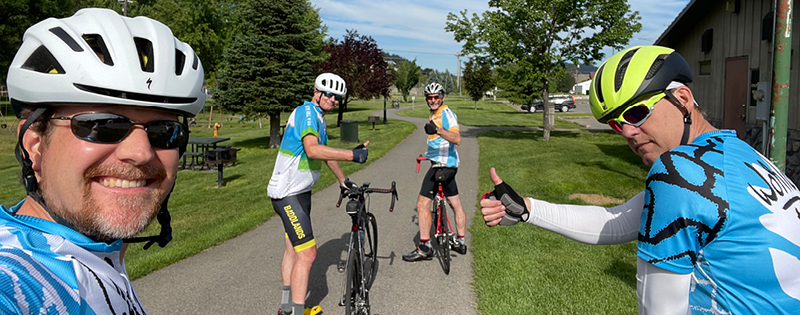
“I never rode more than 40 miles in my training, so I was nervous about how it was going to go!” says Mark Finney a few days after successfully cycling 100 miles of western Idaho with a crew of colleagues from World Relief Spokane, where he serves as executive director. The ride itself went as well as he could hope—perfect weather, no flat tires, a couple of moose sightings—and was part of the World Relief Century Challenge, a fundraiser held by the organization’s Washington offices to support refugees and asylum seekers in the state.
Started six years ago, the annual fundraiser typically traces a route across Washington state but was modified this year due to the pandemic. This time, they opened the Century Challenge up for cyclists to decide their own routes, allowing anybody from anywhere to join in. Mark’s fellow Fuller alumni Kutter Callaway, Robert Covolo, and Eric Dailey took part in Southern California, starting at Fuller’s campus, riding all over greater LA, and getting as far south as Venice Beach.
With about 80 participants, World Relief raised nearly $100,000—which Mark explains will aid resettlement and accelerated employment efforts for refugees and asylum seekers. Mark and Kutter, however, found that the fundraiser had another impact. Kutter, who’d been taking an extended break from social media, decided to return to Facebook to share about the ride in the months leading up to it. He says that in a time when social media has been charged with animosity and contention, he found sharing about the Century Challenge offered a unique means of witness. “I wasn’t calling out people and fighting about issues,” he says, although he acknowledges there are times and places for prophetic confrontation. “I was simply saying, ‘Look, here’s a group of people that matters to Jesus, and here’s something very, very relatively small that I can do to show my solidarity.’” He shares that many fruitful conversations sprung from that. Mark had a similar experience, noting how dialogue surrounding the ride invited others to participate at a level more meaningful than simply donating: “People felt like we were giving them a gift, by allowing them a way to connect with this huge global crisis.”
While the ride only lasted a day, Mark and Kutter point out the harsh reality that, each year, the number of displaced people globally continues to increase. The Century Challenge was one reminder that the task of being a prophetic witness and faithful presence is ongoing—and that there are different and creative ways to engage in this needed work wherever we are. “In terms of caring for those who have been uprooted for any number of reasons,” Kutter says, “we have a lot of work to do.”
“I never rode more than 40 miles in my training, so I was nervous about how it was going to go!” says Mark Finney a few days after successfully cycling 100 miles of western Idaho with a crew of colleagues from World Relief Spokane, where he serves as executive director. The ride itself went as well as he could hope—perfect weather, no flat tires, a couple of moose sightings—and was part of the World Relief Century Challenge, a fundraiser held by the organization’s Washington offices to support refugees and asylum seekers in the state.
Started six years ago, the annual fundraiser typically traces a route across Washington state but was modified this year due to the pandemic. This time, they opened the Century Challenge up for cyclists to decide their own routes, allowing anybody from anywhere to join in. Mark’s fellow Fuller alumni Kutter Callaway, Robert Covolo, and Eric Dailey took part in Southern California, starting at Fuller’s campus, riding all over greater LA, and getting as far south as Venice Beach.
With about 80 participants, World Relief raised nearly $100,000—which Mark explains will aid resettlement and accelerated employment efforts for refugees and asylum seekers. Mark and Kutter, however, found that the fundraiser had another impact. Kutter, who’d been taking an extended break from social media, decided to return to Facebook to share about the ride in the months leading up to it. He says that in a time when social media has been charged with animosity and contention, he found sharing about the Century Challenge offered a unique means of witness. “I wasn’t calling out people and fighting about issues,” he says, although he acknowledges there are times and places for prophetic confrontation. “I was simply saying, ‘Look, here’s a group of people that matters to Jesus, and here’s something very, very relatively small that I can do to show my solidarity.’” He shares that many fruitful conversations sprung from that. Mark had a similar experience, noting how dialogue surrounding the ride invited others to participate at a level more meaningful than simply donating: “People felt like we were giving them a gift, by allowing them a way to connect with this huge global crisis.”
While the ride only lasted a day, Mark and Kutter point out the harsh reality that, each year, the number of displaced people globally continues to increase. The Century Challenge was one reminder that the task of being a prophetic witness and faithful presence is ongoing—and that there are different and creative ways to engage in this needed work wherever we are. “In terms of caring for those who have been uprooted for any number of reasons,” Kutter says, “we have a lot of work to do.”
The world keeps changing, and change always begets more change. A new world means reimagined selves, a reimagined church, and a reimagined way in which disciples of Jesus are prepared to encounter the challenges before us, even as our hope amidst a shifting landscape remains the same: the good news of Christ’s love and justice, God’s kingdom come on earth as it is in heaven.